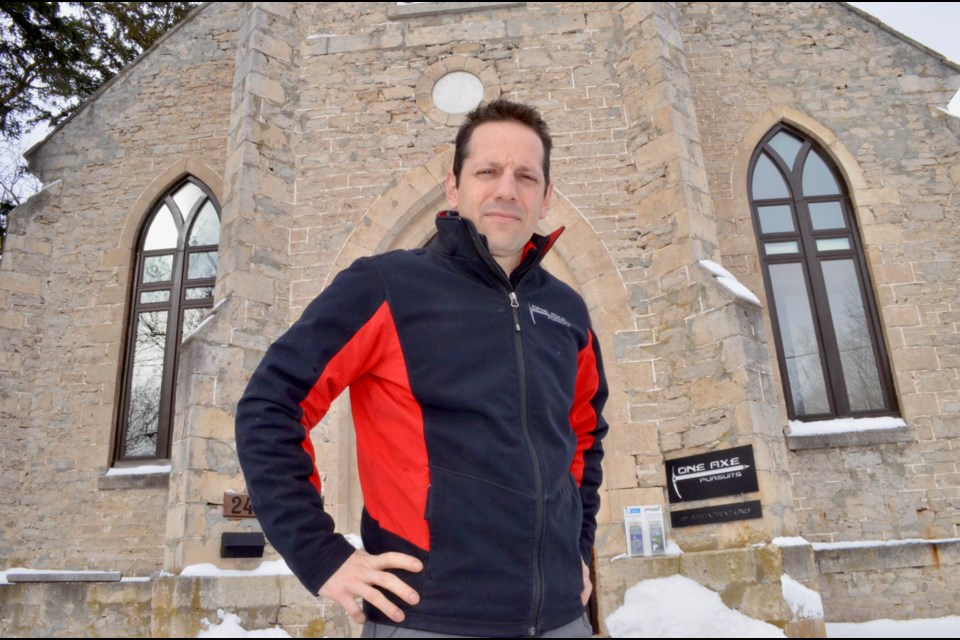Acrophobia, the extreme fear of heights, affects only about six per cent of the population but everyone has an instinctive fear of heights except for maybe Frederick Schuett from One Axe Pursuits in Elora.
Schuett is an accomplished rock climber with too many daring feats under his climbing belt to list and he also runs a business where he teaches aspiring climbers the ropes.
“I guess I am a teacher at heart,” said Schuett. “I get joy from that and I can live vicariously through their experience. I know how it feels when you get to the top for the first time. I’ve been there. It’s awesome.”
He has literally been to the top of mountains on every continent on the planet including Antarctica, usually accompanied by his wife and business partner Christa Niravong, and he knows the exhilaration that comes with conquering your fears.
“I like helping people reach their potential and overcome fear too,” said Schuett. “That’s a big one. If people are scared I will go out of my way to help them. There is nothing more gratifying than when they overcome that fear. Then they are on top of the world. It is great for their mental health.”
Schuett was born in Guelph in 1976, the second oldest of five siblings. His love for adventure was tempered by his plans for a normal career.
“In high school I envisioned myself as an architect,” he said. “I really liked the drafting and the drawing but as I got further into the programs it got more boring. I have too much drive to be outdoors doing exciting things. If I could make this work it would be the better option.”
He worked a few jobs, mostly to fund his climbing adventures and certifications, before teaming up with Niravong in 2001 to launch One Axe Pursuits.
“We started the business together as boyfriend and girlfriend then we got married in 2003,” he said. “We have three children and we live in this building.”
The building is a 150-year-old limestone church in Elora next to the gorge that they purchased in 2012 and transformed into a home and rock-climbing training centre.
“It was totally condemned when we bought it so, it was a big reno,” said Schuett. “We do a lot of our safety and demos indoors where you are warm then we walk down the street and build our own ice. It is literally 200 metres from the building so it really is a unique spot to be operating.”
They offer a variety of activities and programs including urban repelling, zipline, caving and mountaineering but the big draw this time of year is ice climbing and the clients come from far and wide.
“Most of our clients are from Toronto or the GTA but we sometimes get people from Michigan and New York State,” said Schuett. “They are typically between 25 and 45 but we’ve had older and we’ve had younger. A lot of them are professionals in the sense that they are in a career and have the time and the finances to do it.”
It is a daring and exciting activity but it isn’t reckless. Every climbing day starts off indoors with Schuett giving safety instructions and showing an ice-climbing video.
“It is very technique heavy and counter intuitive,” said Schuett. “I take a lot of time to explain so when you get on the wall you can actually move instead of not going anywhere and feeling frustrated.”
Climbers are fitted with boots and crampons (metal spikes that fit over the boots) then geared up with helmets and harnasses.
“I do a little refresher for anyone that doesn’t know how to belay and then we will hike down to the ice,” said Schuett. “A belay is the person that keeps the rope tight so if someone slips they don’t fall. The device they use is called a belay device. A climb is a two person thing. One person climbs and one person belays.”
The ropes are prepared in advance so the climbers can get started as soon as they get to the bottom of the gorge. An ideal group consists of six climbers.
“That way I can be watching and there can literally be three people climbing and three people belaying,” said Schuett. “So, there are six people all busy and I can just monitor and make sure everyone is doing their belay properly and safely.”
All of the attention to safety allows people to overcome their fears and focus on the climb.
“Often if they conquer that fear, even just a little bit, it is a life-changing event,” said Schuett. “I have read many reviews where people have described it as their best experience ever. That’s what we want. We want people to leave feeling that way.”

.png;w=120;h=80;mode=crop)

